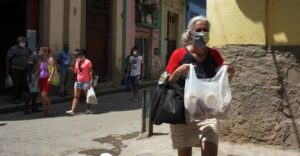Washington, D.C.—The U.S. embargo on Cuba will turn fifty on Tuesday. In five decades, the embargo has hurt the Cuban people, damaged U.S. interests and families, and failed to accomplish its goals, according to the Washington Office on Latin America (WOLA).
"The embargo is a relic, a left over from the Cold War. When it was imposed in 1962, there were tremendous tensions between the United States and the Soviet Union. Our leaders saw every issue as part of a proxy war with Soviet Communism. That was too simple-minded an analysis then. It’s even more unwarranted today, when the Soviet Union no longer exists and the world has become multi-polar," said Geoff Thale, Program Director at WOLA, who just returned from a research trip to the island. "This outdated embargo only hurts the Cuban people, their families in the United States, and U.S. interests."
Today, Cuba is undergoing profound economic and political transformations. The Cuban government is seeking to modify the country’s economic system through a process of gradual reform aimed at moving Cuba toward a more mixed economy. Cuba has given more than 300,000 licenses for Cubans to pursue self-employment, and the government plans to shift up to forty percent of jobs to the private sector in coming years. At a conference in January of 2012, the Cuban Communist Party approved introducing term limits for high-level positions. And religious freedom in Cuba has improved in the last two decades. In particular, the Catholic Church has been involved in dialogue with the Cuban government, which led to the release of more than a hundred political prisoners last year. Most U.S. allies, including the United Kingdom and Canada, have normalized relations with the island and are pursuing strategies of engagement rather than isolation.
"The world has changed dramatically over the last two decades, but the U.S. embargo on Cuba has stayed locked in place. The Soviet Union stopped supporting Cuba, but the embargo didn’t end. Cuba stopped supporting revolutionary movements in Latin America, but the embargo didn’t end. Following dialogue with the Cuban Catholic Church, Cuba released its remaining political prisoners last year, but the embargo didn’t end," said Thale. "The fact is that rather than adjusting U.S. policy toward Cuba to suit a changing world, defenders of the embargo have focused on adjusting their arguments in order to preserve an outdated policy."
President Obama’s relaxation of travel restrictions was a step in the right direction. In 2011, Cuban Americans made more than 400,000 visits to Cuba and sent hundreds of millions of dollars to family members there. The Cuban-American community, which has traditionally taken a hard line against engagements with Cuba, is beginning to relax its stance: according to a Florida International University poll, 46 percent of Cuban-Americans oppose the embargo, and demographic trends show this number will increase with time. Yet, the United States' ability to ensure that meaningful democratization accompanies economic liberalization in Cuba remains extremely limited. The U.S. embargo has had the ironic consequence of excluding the United States from the real process of change that is happening in Cuba.
"Congress isn’t going to drop the embargo overnight. But sensible politicians ought to be pushing for greater engagement and dialogue between Cuba and the United States. Cuba is changing, and we shouldn’t spend the next fifty years standing on the sidelines," said Thale.
Contact
Kristel Mucino
Director of Communications
kmucino@wola.org
202-797-2171
Photo by Samuel Negredo via Flickr Creative Commons.


